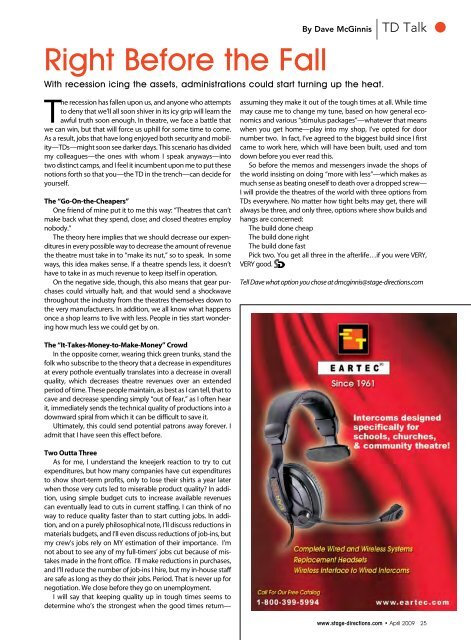Download a PDF - Stage Directions Magazine
Download a PDF - Stage Directions Magazine
Download a PDF - Stage Directions Magazine
You also want an ePaper? Increase the reach of your titles
YUMPU automatically turns print PDFs into web optimized ePapers that Google loves.
Right Before the Fall<br />
By Dave McGinnis<br />
|<br />
With recession icing the assets, administrations could start turning up the heat.<br />
TD Talk<br />
The recession has fallen upon us, and anyone who attempts<br />
to deny that we’ll all soon shiver in its icy grip will learn the<br />
awful truth soon enough. In theatre, we face a battle that<br />
we can win, but that will force us uphill for some time to come.<br />
As a result, jobs that have long enjoyed both security and mobility—TDs—might<br />
soon see darker days. This scenario has divided<br />
my colleagues—the ones with whom I speak anyways—into<br />
two distinct camps, and I feel it incumbent upon me to put these<br />
notions forth so that you—the TD in the trench—can decide for<br />
yourself.<br />
The “Go-On-the-Cheapers”<br />
One friend of mine put it to me this way: “Theatres that can’t<br />
make back what they spend, close; and closed theatres employ<br />
nobody.”<br />
The theory here implies that we should decrease our expenditures<br />
in every possible way to decrease the amount of revenue<br />
the theatre must take in to “make its nut,” so to speak. In some<br />
ways, this idea makes sense. If a theatre spends less, it doesn’t<br />
have to take in as much revenue to keep itself in operation.<br />
On the negative side, though, this also means that gear purchases<br />
could virtually halt, and that would send a shockwave<br />
throughout the industry from the theatres themselves down to<br />
the very manufacturers. In addition, we all know what happens<br />
once a shop learns to live with less. People in ties start wondering<br />
how much less we could get by on.<br />
assuming they make it out of the tough times at all. While time<br />
may cause me to change my tune, based on how general economics<br />
and various “stimulus packages”—whatever that means<br />
when you get home—play into my shop, I’ve opted for door<br />
number two. In fact, I’ve agreed to the biggest build since I first<br />
came to work here, which will have been built, used and torn<br />
down before you ever read this.<br />
So before the memos and messengers invade the shops of<br />
the world insisting on doing “more with less”—which makes as<br />
much sense as beating oneself to death over a dropped screw—<br />
I will provide the theatres of the world with three options from<br />
TDs everywhere. No matter how tight belts may get, there will<br />
always be three, and only three, options where show builds and<br />
hangs are concerned:<br />
The build done cheap<br />
The build done right<br />
The build done fast<br />
Pick two. You get all three in the afterlife…if you were VERY,<br />
VERY good.<br />
Tell Dave what option you chose at dmcginnis@stage-directions.com<br />
The “It-Takes-Money-to-Make-Money” Crowd<br />
In the opposite corner, wearing thick green trunks, stand the<br />
folk who subscribe to the theory that a decrease in expenditures<br />
at every pothole eventually translates into a decrease in overall<br />
quality, which decreases theatre revenues over an extended<br />
period of time. These people maintain, as best as I can tell, that to<br />
cave and decrease spending simply “out of fear,” as I often hear<br />
it, immediately sends the technical quality of productions into a<br />
downward spiral from which it can be difficult to save it.<br />
Ultimately, this could send potential patrons away forever. I<br />
admit that I have seen this effect before.<br />
Two Outta Three<br />
As for me, I understand the kneejerk reaction to try to cut<br />
expenditures, but how many companies have cut expenditures<br />
to show short-term profits, only to lose their shirts a year later<br />
when those very cuts led to miserable product quality? In addition,<br />
using simple budget cuts to increase available revenues<br />
can eventually lead to cuts in current staffing. I can think of no<br />
way to reduce quality faster than to start cutting jobs. In addition,<br />
and on a purely philosophical note, I’ll discuss reductions in<br />
materials budgets, and I’ll even discuss reductions of job-ins, but<br />
my crew’s jobs rely on MY estimation of their importance. I’m<br />
not about to see any of my full-timers’ jobs cut because of mistakes<br />
made in the front office. I’ll make reductions in purchases,<br />
and I’ll reduce the number of job-ins I hire, but my in-house staff<br />
are safe as long as they do their jobs. Period. That is never up for<br />
negotiation. We close before they go on unemployment.<br />
I will say that keeping quality up in tough times seems to<br />
determine who’s the strongest when the good times return—<br />
www.stage-directions.com • April 2009 25

















